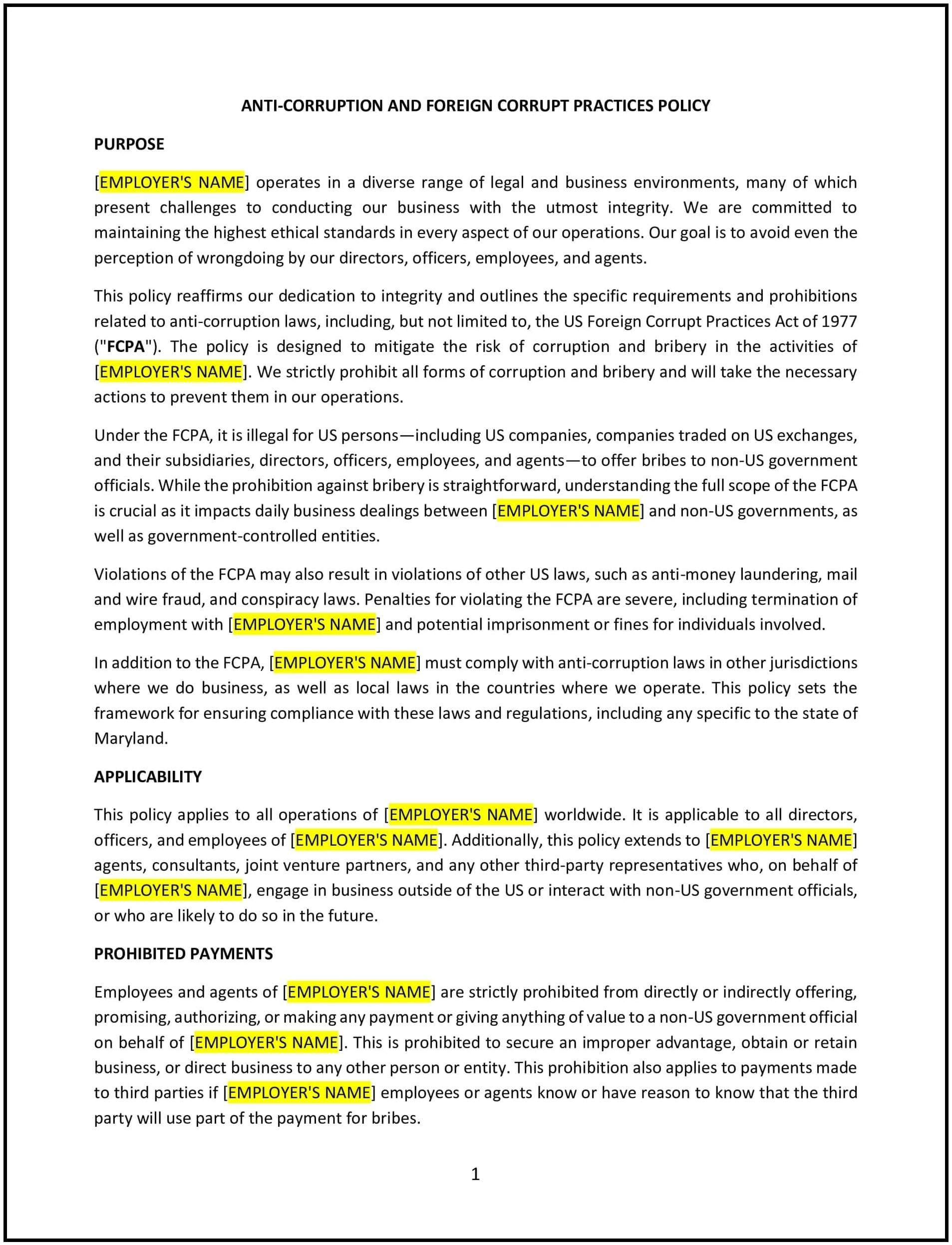Anti-corruption and foreign corrupt practices policy (Maryland): Free template
Got contracts to review? While you're here for policies, let Cobrief make contract review effortless—start your free review now.

Customize this template for free
Anti-corruption and foreign corrupt practices policy (Maryland)
This anti-corruption and foreign corrupt practices policy is designed to help Maryland businesses uphold ethical practices and comply with anti-corruption laws, including the U.S. Foreign Corrupt Practices Act (FCPA). It outlines guidelines to prevent bribery, improper payments, and unethical behavior in business operations, ensuring transparency and integrity in dealings both domestically and internationally.
By implementing this policy, Maryland businesses can promote ethical conduct, reduce the risk of legal violations, and safeguard their reputation in a competitive marketplace.
How to use this anti-corruption and foreign corrupt practices policy (Maryland)
- Define key terms: Clearly explain critical concepts such as bribery, corruption, and facilitation payments to ensure employees understand prohibited practices.
- Outline prohibited actions: Specify activities that are not allowed, such as offering or accepting bribes, kickbacks, or gifts intended to influence business decisions.
- Establish reporting requirements: Provide a confidential process for employees to report suspected violations without fear of retaliation.
- Include training requirements: Ensure employees, contractors, and key stakeholders are trained to recognize and avoid corrupt practices.
- Clarify third-party compliance: Require vendors, suppliers, and partners to adhere to anti-corruption standards as part of their agreements with the business.
- Assign accountability: Designate responsible personnel to oversee compliance and investigate reported violations.
- Highlight penalties: Detail the consequences of non-compliance, including disciplinary actions and potential legal ramifications.
- Regularly review: Update the policy to reflect changes in Maryland laws, federal regulations, or business operations.
Benefits of using this anti-corruption and foreign corrupt practices policy (Maryland)
Implementing this policy provides Maryland businesses with the following benefits:
- Promotes ethical behavior: Reinforces a commitment to honesty and integrity across all business activities.
- Protects business reputation: Safeguards the organization from reputational harm caused by unethical practices.
- Reduces legal risk: Supports compliance with the FCPA and Maryland’s anti-corruption regulations.
- Builds stakeholder trust: Enhances credibility with clients, partners, and employees by demonstrating a commitment to ethical practices.
- Encourages accountability: Creates a clear framework for reporting and addressing unethical behavior.
Tips for using this anti-corruption and foreign corrupt practices policy (Maryland)
- Educate employees: Provide regular training on recognizing and avoiding corruption risks, tailored to Maryland laws and business operations.
- Monitor third-party relationships: Conduct due diligence on vendors, suppliers, and partners to ensure alignment with the policy.
- Create awareness: Promote the policy in employee handbooks, onboarding materials, and internal communications.
- Foster a speak-up culture: Encourage employees to report concerns without fear of retaliation and emphasize confidentiality.
- Regularly assess risks: Periodically evaluate areas of operation most vulnerable to corruption and adjust policies accordingly.
- Stay compliant: Keep up with updates to Maryland and federal anti-corruption laws to maintain an effective policy.